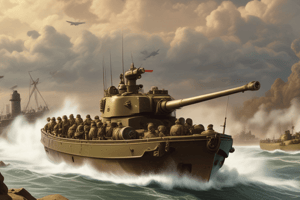Podcast
Questions and Answers
Which event led to the death of 146 workers due to locked doors and lack of safety measures?
Which event led to the death of 146 workers due to locked doors and lack of safety measures?
- The Triangle Shirtwaist Factory fire (correct)
- The rise of urbanization
- The construction of the Panama Canal
- The outbreak of World War I
Who was a prominent suffragette during the Progressive Era?
Who was a prominent suffragette during the Progressive Era?
- Booker T. Washington
- Frances Garrison Villard (correct)
- Theodore Roosevelt
- W.E.B. Du Bois
Which individual advocated for self-improvement through work and vocational training for African Americans?
Which individual advocated for self-improvement through work and vocational training for African Americans?
- Theodore Roosevelt
- W.E.B. Du Bois
- Frances Garrison Villard
- Booker T. Washington (correct)
What triggered the outbreak of World War I in 1914?
What triggered the outbreak of World War I in 1914?
Which president's term marked a shift toward American imperialism symbolized by the construction of the Panama Canal?
Which president's term marked a shift toward American imperialism symbolized by the construction of the Panama Canal?
Which era saw movements for social reform, women's rights, and suffrage?
Which era saw movements for social reform, women's rights, and suffrage?
What technological innovations revolutionized daily life in the 20th century?
What technological innovations revolutionized daily life in the 20th century?
Which event symbolized American values of material abundance and freedom in the 20th century?
Which event symbolized American values of material abundance and freedom in the 20th century?
What key aspect of the 20th-century leadership is highlighted in the text?
What key aspect of the 20th-century leadership is highlighted in the text?
Which societal changes influenced the evolution of schools in the 20th century?
Which societal changes influenced the evolution of schools in the 20th century?
What was one of the challenges faced in the 20th century related to racial issues?
What was one of the challenges faced in the 20th century related to racial issues?
Which significant American symbol is associated with feelings of liberty and hope for immigrants?
Which significant American symbol is associated with feelings of liberty and hope for immigrants?
Study Notes
- Edison Phonograph, Japanese attack on Pearl Harbor, Kennedy assassination, moon landing, fall of the Berlin Wall, and key civil rights moments are highlighted from the 20th century.
- The 20th century brought significant changes to American towns and cities, with annual celebrations marking historical events and the resilience of communities during tough times.
- Evolution of schools from teaching shop and typing to computer skills, reflecting societal changes and advancements in education.
- Challenges faced by women and racial segregation in coffee shops are highlighted, showcasing the struggles for equality and change in attitudes over time.
- Memorials along main streets honor those who died in World War I and World War II, reflecting the impact of war on American communities.
- The 20th century saw transformations in leadership, with a focus on the common man's will and actions shaping the era significantly.
- Technological innovations like phonographs, electric light bulbs, telephones, and automobiles revolutionized daily life, highlighting America's inventive spirit and progress.
- Henry Ford's introduction of the Model T at an affordable price revolutionized the automobile industry, making cars more accessible to the masses and symbolizing American values of material abundance and freedom.- Clara Hancox describes the feeling of liberty and hope upon approaching the Statue of Liberty in New York Harbor as an immigrant.
- Immigrants in Pittsburgh faced harsh working conditions in steel mills, foundries, and coal mines, with no safety precautions and frequent accidents.
- Workers in industrial America faced long hours, low wages, and dangerous working conditions, with children as young as four also being made to work.
- The Triangle Shirtwaist Factory fire in 1911 resulted in the death of 146 workers due to locked doors and lack of safety measures.
- The Progressive Era saw movements for social reform, women's rights, and suffrage, with Frances Garrison Villard being a prominent suffragette.
- Booker T. Washington advocated for self-improvement through work and vocational training for African Americans, while W.E.B. Du Bois pushed for full equality and civil rights.
- The early 20th century saw a rise in urbanization, technological advancements, and entertainment options like movies and public libraries.
- Theodore Roosevelt's presidency marked a shift towards American imperialism, symbolized by the Panama Canal construction and his aggressive foreign policy.
- The outbreak of World War I in 1914 was triggered by the assassination of Archduke Franz Ferdinand and escalated into a catastrophic conflict involving major European powers.
Studying That Suits You
Use AI to generate personalized quizzes and flashcards to suit your learning preferences.
Description
Explore key events, societal changes, advancements, struggles for equality, and technological innovations that shaped America in the 20th century. From historical milestones to challenges faced by different communities, this quiz delves into the dynamic landscape of American history.




